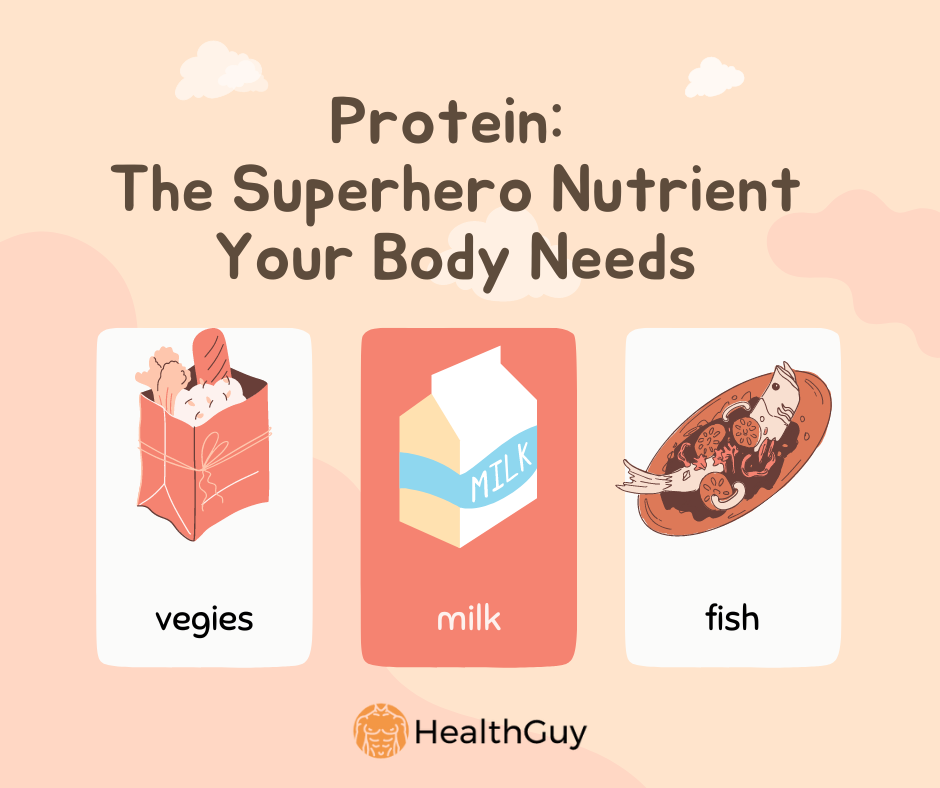
Protein: The Superhero Nutrient Your Body Needs
Protein is an essential macronutrient that is required by the body to perform various functions. It is important to have an adequate amount of protein in your diet to maintain good health. In this article, we will discuss the role and functions of proteins, as well as some sources of protein.
Role and Functions of Protein:
- Building blocks: Proteins are the building blocks of the body. They help in the growth and repair of tissues, including muscles, bones, skin, and hair.
- Enzymes: Proteins act as enzymes, which are essential for metabolic processes in the body. They speed up chemical reactions and help in the digestion of food.
- Hormones: Some proteins act as hormones, which regulate various bodily functions, including growth, reproduction, and metabolism.
- Transport: Proteins act as carriers, transporting oxygen, nutrients, and other substances throughout the body.
- Immunity: Some proteins help in the functioning of the immune system, protecting the body against infections and diseases.
Sources of Protein:
- Meat: Beef, chicken, pork, lamb, and other meats are high in protein.
- Seafood: Fish and other seafood are excellent sources of protein, and they are also rich in omega-3 fatty acids.
- Eggs: Eggs are a good source of protein and can be included in various dishes.
- Dairy: Milk, cheese, and yoghurt are rich in protein and also provide other essential nutrients like calcium and vitamin D.
- Legumes: Beans, lentils, and peas are great sources of protein, especially for vegetarians and vegans.
- Nuts and seeds: Almonds, peanuts, pumpkin seeds, and chia seeds are also good sources of protein and healthy fats.
Protein is a critical nutrient that is essential for the body’s growth, repair, and maintenance. However, there are several myths and misconceptions surrounding protein that can lead to confusion. Also, we will explore some common protein myths and separate fact from fiction.
Myth: You need to consume a lot of protein to build muscle.
Fact: While protein is essential for muscle growth and repair, consuming excessive amounts of protein does not necessarily lead to more muscle mass. The body can only absorb and use a certain amount of protein, and excess protein is typically excreted from the body.
Myth: Animal protein is better than plant protein.
Fact: Both animal and plant protein sources can provide all the essential amino acids needed by the body. However, animal protein sources tend to be higher in saturated fats and cholesterol, while plant-based proteins are often lower in fat and higher in fibre and other nutrients.
Myth: Protein supplements are necessary for athletes and bodybuilders.
Fact: While protein supplements can be convenient, they are not necessary for most people, including athletes and bodybuilders. A well-balanced diet that includes a variety of protein sources can provide all the protein needed by the body.
Myth: High-protein diets are harmful to the kidneys.
Fact: While individuals with pre-existing kidney disease should limit their protein intake, healthy individuals can safely consume a high-protein diet without any negative effects on kidney function.
Myth: You need to consume protein immediately after a workout.
Fact: While consuming protein after a workout can help with muscle recovery, it is not necessary to consume it immediately. The body continues to build muscle for several hours after a workout, so consuming protein within a few hours is sufficient.
Vegetarian Protein Sources: A Guide to Getting Enough Protein in Your Diet
Many people believe that a vegetarian diet is lacking in protein, but this is not necessarily the case. Many excellent vegetarian sources of protein can provide all the essential amino acids needed by the body. Here, we will explore some of the best vegetarian protein sources and how to incorporate them into your diet.
Legumes:
Legumes are an excellent source of vegetarian protein. Lentils, beans, and chickpeas are all high in protein and can be used in a variety of dishes such as salads, soups, and stews. One cup of cooked lentils contains around 18 grams of protein, while one cup of cooked black beans contains around 15 grams of protein.
Nuts and Seeds:
Nuts and seeds are other excellent sources of vegetarian protein. Almonds, peanuts, pumpkin seeds, chia seeds, and flax seeds are all good sources of protein and healthy fats. One ounce of almonds contains around 6 grams of protein, while one ounce of pumpkin seeds contains around 9 grams of protein.
Soy:
Soybeans and soy products such as tofu, tempeh, and edamame are all excellent sources of vegetarian protein. Soy is also a complete protein, meaning that it contains all the essential amino acids needed by the body. One cup of cooked soybeans contains around 29 grams of protein, while one cup of firm tofu contains around 20 grams of protein.
Quinoa:
Quinoa is a versatile grain that is high in protein and can be used in a variety of dishes. One cup of cooked quinoa contains around 8 grams of protein. Quinoa is also a complete protein, meaning that it contains all the essential amino acids needed by the body.
Dairy:
Milk, cheese, and yoghurt are all good sources of protein for lacto-vegetarians. One cup of milk contains around 8 grams of protein, while one ounce of cheddar cheese contains around 7 grams of protein.
Vegetables:
Many vegetables such as spinach, broccoli, and Brussels sprouts are high in protein and can be used in a variety of dishes. One cup of cooked spinach contains around 5 grams of protein, while one cup of cooked broccoli contains around 4 grams of protein.
Protein is an essential nutrient that plays a vital role in the body’s functioning. Including protein-rich foods in your diet can help you maintain good health and prevent various health problems. Try to incorporate a variety of protein sources in your meals to ensure that you are getting all the essential amino acids your body needs.
